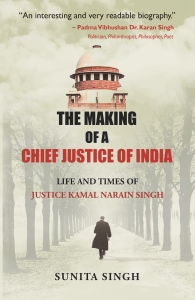
FOREWORD
If you can walk with Kings—nor lose the common touch. . . Amongst the numerous traits that my father possesses, the above line of Rudyard Kipling truly defines the man I have the privilege of calling my father.
Straight backed and tall in physicality, steadfast and righteous in stature, but never unyielding or arrogant. My father leads his life by example, gifted with the unique quality of being able to converse with the crème de la crème of the society with equal ease as with the humble farmer. A first among equals, my father is a man of the world—pragmatic and practical, however, also deeply religious, and spiritual. As is the law of nature, whenever time and tide were not in his favour, he was gracious and unflappable. He refuses to give up, is an eternal optimist and an ardent believer of karma. His ability to live each day, enriching it with experiences and novelty till this day, is a virtue that one can only aspire towards.
Though strict with all his five children, he was never unreasonable and was always fair.
Being in the same professional arena, there are innumerable incidents and achievements to encapsulate, however, my heart truly desires to bring forth the various shades of his enigmatic persona which perhaps only a child can delve into and which I believe makes my father in a class of his own. My father’s construct was such that if any person approached him for seeking either his valued advice or favour, he would not rest easy until a way was devised to help. This seeker could be a well-heeled member of the society or from its fringes. He refused to differentiate. All my life I have seen him help countless people while neither wishing nor accepting anything in return. I regularly come across several people, though strangers to me, narrate how his benevolence helped them earn their living or how they benefited from his candid advice. I learnt this quality from him, and it does become difficult at times, but I immediately recollect some or the other instance of his journey. I still have dozens of people living with me and him, and it’s only because he never turned out anyone, even though they may have become a burden. His ways of giving back to society were discreet and constant. These virtues of compassion and empathy are hard to come by, in today’s times. He never did anyone any harm, at least not with an intent to do so, whatever untoward happened, if at all, was always without intent.
His judgements and decisions, whether personal or professional, have never been influenced by his personal feelings or inclinations. This pragmatism of spirit and sharp discernment, un-swayed by bias or prejudice, have been evident in every aspect of his life. My father, even at 96, has an uncanny insight into people’s minds and motivations, an advantage of having spent his years amongst people of different backgrounds, professions, and strata.
There is an exhaustive list of adjectives that I can attribute to him, however, some unforgettable episodes flash before me as I write this Foreword.
At the start of my own journey as a lawyer, my father confided in me that ‘this world is full of all kinds of people, and men of character may be few, but they will always be feared by the unscrupulous. Imbibe this and you’ll succeed in life.’ Since I am a retired judge now, who is back in public life, without going into the specific instances, I will take the liberty of mentioning that a person holding a high office faces various powerful influences. I still distinctly remember that, right before my elevation as a judge, my father’s one sage piece of advice to me was ‘prove your worth through your work’, the same principle he has lived his life by. That determination still rings in my ears.
Another incident which left an indelible mark on my memory was on the eve of my elevation to the Bench. As was normal in our court, retired judges occupy one corner of the podium. I had seen several Oath-taking ceremonies, where the incumbent would walk around the podium to touch their retired father’s feet before sitting with his companion judges, and I also wanted to do the same. On my mentioning it to him, he politely refused and said, “If you want to touch my feet, do it now or when you return after the first day on the Bench, but not on the podium, where you are nobody’s son or relative, but only an impartial judge.” He made his point, and I got a valuable and poignant lesson for my conduct as a judge.
To be a fortunate son of such an exceptional man rendered me with an unenviable position of exacting standard and expectations, though never from him. However, with this also came a literal repository of inspiration, fortitude, and a shining example for me to emulate which I have tried to do in all earnest.
My father, for me, is and always will be a fountain of virtues. He has taught me how to deal with adversities and overcome the pain of failures, to meet big and small successes with a level head, and the art of conveying the most painful facts in soothing ways. I can go on and on but let me confine myself to this book. This book tells the story of hard work and self-belief and gives an insight into the vagaries of life.
My father’s persona stands tall; however, it has not dimmed his spirit of camaraderie amongst his peers as well as people who just came in his contact for some help they required. His ability to live each day, enriching it with experiences and novelty till this day, is a virtue that one can only aspire towards. The cornerstone of his personality is undoubtedly the fact that he treats everyone across various strata with equal amount of respect and congeniality. His life and the lessons that he set, by way of example, are what serve me as my very own guidebook.
A more recent incident comes to mind, which happened a couple of years ago. At the time, my father was not well and was admitted to the hospital. He was weak to an extent that he was having a tough time talking to anyone. My son, Devansh, was attending to him, and I was sitting on a couch reading a newspaper. Devansh asked a very basic question, probably to engage my father in a conversation. He queried, “Baba, what was your secret to success?” He took a long pause and replied, “I worked very hard, but I was also very lucky, I have seen people brighter than me, struggle in the profession. A lawyer has to be equipped with not just knowledge of law but also with the power of resilience.” To me, this seemingly innocuous sentence from the man, lying feeble in a hospital bed in the twilight of his life, with an ability to look back at his extraordinary life with an uncluttered view sans any vanity, speaks volumes of his pragmatic spirit and perfectly sums up the struggles of a lawyer or judge.
My youngest sister, Sunita, has written this book after several interview sessions with our father and has taken a lot of pains to make it interesting and at the same time factually correct. I hope the readers of this labour of love are able to recognize that we felt that it would be remiss on our part to not write about our father whose times have been perhaps larger than life.
Justice Devendra Pratap Singh
Former Judge
Allahabad High Court
About the Author



Comments